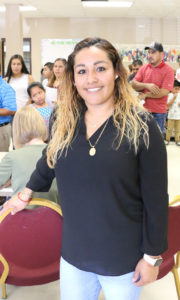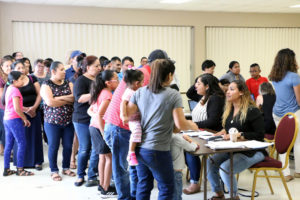St. Patrick Parish leader finds herself on the front line of the immigration issue in East Tennessee
By Bill Brewer
This is a busy time of year for Veronica Galvan.
The director of religious education and adult faith formation coordinator at St. Patrick Church in Morristown has been registering families for CCD classes and preparing for the 2019-20 RCIA year.
The turnout for parish programs at St. Patrick has been strong, with parents and students tugging at Mrs. Galvan for assistance in guiding them where they need to be, whether elementary-age, middle school-age, high school-age, or adult formation classes.
And then there are the phone calls she gets at any time of the day or night with urgent pleas for help from Hispanic parishioners and residents in the Five Rivers Deanery area.
As a longtime St. Patrick parishioner and resident of Morristown, Mrs. Galvan has become a liaison for the Latino community. The Mexico native is a point person for translating between Spanish-speaking and English-speaking people in Hamblen, Jefferson, and Grainger counties, especially in emergencies.
Those emergencies seem to be much more frequent since April 2018, when federal agents raided a Grainger County meatpacking plant and held 86 people whose immigration statuses were questioned. Of those, 54 were detained for further immigration proceedings.
Once the raid was carried out, families were separated, with wives or husbands and children left behind.
St. Patrick Church, led by its pastor, Father Patrick Brownell, opened its doors immediately to people affected by the raid. Father Alex Waraksa, who ministers to Hispanic congregations at several Diocese of Knoxville parishes, and Father Steve Pawelk, GHM, pastor of St. John Paul II Catholic Mission in Grainger County and St. Teresa of Kolkata Parish in Union County, rushed in to assist because their parishioners were affected, too.
St. Patrick also joined with other faith communities in the area to provide food and additional necessities to families feeling the impact.
The Grainger raid and other actions in the area by Immigration and Customs Enforcement officers to hold, detain, and deport undocumented residents has caused a pall of fear to descend over the Latino communities of East Tennessee. Mrs. Galvan sees that fear almost daily.
The raid and others like it, such as the ones in Mississippi on Aug. 7, as well as ongoing immigration issues from coast to coast and border to border, are fueling debate in many communities about how the United States should resolve the immigration crisis.
The Catholic Church is actively promulgating Church teaching to guide communities on this controversial issue. And the U.S. Conference of Catholic Bishops is taking a leading role in that formation.
Still, Church communities often are split on how to address immigration.
One Friday morning in early August as she went over final details before annual religious-education registration began, Mrs. Galvan spoke to a panicked caller who reported ICE officers were again in the area detaining Hispanic residents.
Mrs. Galvan put everything on hold to rush to the caller’s aid — and possibly the aid of others.
It’s just part of the new normal for Mrs. Galvan and the Hispanic community she serves.
Hispanic parishioners make up a large part of the community at St. Patrick, where they are about half of the registered members. Many unregistered Latinos also attend.
According to Mrs. Galvan, St. Patrick has one of the larger Hispanic communities in the Diocese of Knoxville. And the number of Latino men and women who work in the Five Rivers area for local farmers, businesses that produce food and supply goods, and who help operate small businesses that serve the community has attracted the interest of the U.S. Department of Homeland Security, which includes ICE.
The Grainger County raid prompted St. Patrick to alter Mrs. Galvan’s parish duties, freeing her to assist a Hispanic community in turmoil.
“I’m constantly getting calls from people. After the raid, it got so busy I had to give up (producing) the church bulletin. When the raid happened, I was called on to help. It was easier for families to come forward and talk to me because I was someone they knew and trusted,” Mrs. Galvan said.
“That is still continuing to happen. Since the raid, the need for people to find someone to help them has increased a lot,” she added.
She believes the raid has magnified an attitude of discrimination among some in the area, where she is hearing more racist comments.
“The negativity is much bigger than I thought it was, and we are seeing an increase in law-enforcement activity,” said Mrs. Galvan, a wife and mother of two children.
She knows of Latino drivers being pulled over by local, state, and federal officers and having their immigration status checked.
“I have been pulled over a few times. I wasn’t speeding or anything. They just checked my driver’s license and insurance,” she said. “You can get pulled over for something as minor as your license plate is dirty or the taillight isn’t working, and that can lead to being detained and deported.”
In fact, Mrs. Galvan said she was pulled over three times within 10 minutes one night driving through town, a distance of less than 10 miles.
“My headlights had been working fine, but I got pulled over because my headlight had gone out. They let me go with a warning. Then two miles later, I got pulled over again for the same thing. Then a mile and a half later, I was pulled over for the same thing on the same street,” she recalled. “It was very frustrating. I drive around and see cars with duct tape holding them together, yet I get pulled over three times.”
That was yet another wake-up call for Mrs. Galvan.
“I understand the fear of getting deported,” she acknowledged.
Mrs. Galvan related a recent situation that she cited as an example of what is occurring in her community.
In July, a husband and father was driving to work just before dawn and was pulled over by an officer who said a light on his car was out.
The officer remarked that it was suspicious he was driving at 5 a.m.
“A taillight or brake light was out. They confiscated his cell phone and wouldn’t let him make a call. His wife figured out he wasn’t at work when he did not return home. By the time she found out, he already had an immigration hold on him,” Mrs. Galvan said.
She explained that an immigration hold is when undocumented individuals are picked up and held until they appear before an immigration judge, who can order the individuals detained in a holding facility (typically in Alabama or Louisiana) until they sign a voluntary leave of departure order, they are deported, or they are able to make bond and remain in the United States pending an official deportation hearing.
Individuals who make bond typically are represented by a lawyer, which are costs many Hispanic families can’t afford.
Mrs. Galvan believes 40 percent of individuals placed on an immigration hold are assigned a court date and are able to plead their case before an immigration judge. The other 60 percent are deported by either signing a voluntary leave of departure order or having no recourse but to be removed from the country.
Since the 2018 raid, Mrs. Galvan said she has been contacted nearly a dozen times with reports of enforcement officers sweeping in and holding residents.
In each instance, she tries to be a reassuring influence.
“I want to try to make people feel at ease. I try to calm people, calm the community,” she said.
Not every call she receives involves ICE and a potential deportation.
She often is called to assist residents with daily issues, such as dealing with lenders, health-care providers, and funeral homes when there is a death in the family.
In June 2018, she was called in by Hamblen County first responders to translate for them and the families of two Hispanic teens who drowned in Cherokee Lake. She said rescue personnel needed her to communicate with the families of a 15-year-old girl and her 16-year-old boyfriend. The pair had been wading in the lake when she slipped and went under and he went under trying to save her.
“I know how it feels. I’ve been translating for my family and others since I was 5 years old. Helping is a fulfilling thing for me. I know how it is to need help and not have someone there to help,” Mrs. Galvan said. When asked, she said her work in the St. Patrick and Five Rivers communities — except for her DRE position — is a volunteer ministry.
As heartbreaking as many of her instances of assistance are, she also shares success stories in working with Latinos in the community.
In addition to being involved in the PTO at her children’s schools, Mrs. Galvan works with Walters State Community College and its RHiTA (Recruiting Hispanics to Achieve) program. The outreach program gives Hispanic students an opportunity for a college education. Mrs. Galvan works with Walters State to identify Latino youths who are eligible.
“The program recruits Hispanic students after high school to continue their education. There is no financial aid for DREAMers. They pay out-of-state tuition,” she said about immigrants who entered the United States as minors and were granted residency status via the federal DREAM Act.
“There are success stories there,” she noted.
And when she reflects on those successes, Mrs. Galvan thinks of all the children affected by the immigration crisis, including her own.
She remembered confirmation last year, when Bishop Richard F. Stika called for all parish confirmations to be held in the new Cathedral of the Most Sacred Heart of Jesus. However, he allowed St. Patrick’s confirmation Mass to remain in Morristown because Hispanic parishioners were too fearful to travel to Knoxville following the Grainger County raid.
“Bishop Stika acknowledged that fear and let us have confirmation here,” she said, noting that many Hispanic parishioners at St. Patrick have stopped attending Masses and special programs at other parishes for fear of being detained along the way.
“The fear is there. They don’t want to question why an officer is pulling them over. Every time they get in a car, they think this could be the last car ride they make with their kids,” she said, pointing out that her own children have expressed worry that their parents will be detained if they get pulled over by law enforcement.
Hispanic children now realize families are split in two if a parent is detained and deported, leaving both the deported parent and the parent and children remaining in the United States with uncertain futures.
She lamented the long period of time it takes and the high cost to become a U.S. citizen. She knows. She and her husband are in the process of becoming naturalized citizens.
And she has friends who see the issue from the “other” side. They want immigration tightly regulated, with a wall along the southern border and undocumented immigrants returned to their countries of origin.
“I get that. If I were on the other side, I may think that way, too. But I’m on this side,” she said. “There isn’t a ‘right’ way (to immigrate), and the ‘right’ way may not be the best way. If you desperately need help, you can’t pay tens of thousands of dollars to change your immigration status. That’s why they’re coming here. They’re struggling to keep their families alive. Their dreams are never to pack up their belongings in backpacks and travel with their families to a strange land without any resources.”
Although she acknowledges the fear of deportation is palpable throughout the community, she battles the pall and vows to keep helping her Hispanic neighbors.
“I can’t let fear dictate my decisions. I can’t make decisions based on fear. I have faith and hope that everything will be OK and everything will work out,” she said.
Blanca Primm, director of Hispanic Ministry for the Diocese of Knoxville, has been helping diocesan parishes and their Latino communities navigate the immigration issues. Her goal is for East Tennessee Catholics to join together for their Hispanic members.
“My hope is that we as a Catholic community in East Tennessee can come together in support of the most vulnerable. We can be their neighbor, the face of Jesus to the suffering, especially under these difficult circumstances when we are tested in our faith and fidelity to Jesus’ commandment of ‘loving one another as He loves each of us.’ This love is expressed through actions. The works of mercy are a great route to follow. We will continue to collaborate with other organizations in the community at large that support and advocate for immigrants because we believe that each person has a dignity given by God as He created them in His image and likeness. We will continue connecting Hispanics to parishes and helping them feel welcome and supported. They are an important part of our diocese,” Mrs. Primm said.
She said the diocesan Office of Hispanic Ministry worked with the Missionary Sisters of the Sacred Heart of Jesus (Ad Gentes) to provide crucial support to those residents affected by the Grainger County raid last year.
“Their (Ad Gentes) accompaniment meant so much to these families as they provided counseling and moral and spiritual support, and they also helped in the organizational process of distribution of groceries and food items to the families in need,” Mrs. Primm said. “The office of Hispanic Ministry also organized the collection of money and goods, and our office served as a drop-off point. We made many trips to deliver donations. Catholic and non-Catholic organizations and individuals generously donated gift cards, groceries and other items that these families needed. We also attended prayer vigils and events organized to advocate for them and show community support.”
The Office of Hispanic Ministry wants to be proactive in assisting the Hispanic community in East Tennessee. Mrs. Primm said her office is aware that the need for residents to have proper identification is of paramount importance. That is why each year the office, in collaboration with some parishes and volunteers, hosts visits from the Mexican Consulate to Knoxville, Kingsport, and Chattanooga, where passport renewals, consular identifications, and registrations of minors as Mexican citizens are issued. She said thousands of individuals and numerous families benefit from this opportunity to obtain a valid ID from Mexico.
“In 2010, the Office of Hispanic Ministry started to collaborate with TIES (Tennessee Immigrant Empowerment Solutions), which has been holding citizenship preparation classes at Sacred Heart Cathedral School offered at no cost by the parish. Each year there are three 10-week classes. TIES teaches the classes at Sacred Heart and other locations in East Tennessee. Of the 406 students who have taken the prep classes, 332 have taken them at the cathedral parish. Ninety-seven percent of those who then sat for the citizenship interview have reported that they passed the interview on the first try,” Mrs. Primm said, noting that a new class begins this month.
In 2017, TIES partnered with Bridge Refugee Services and received a grant to develop a course to help immigrants and refugees get their learners permit for driving. The course is called Drive Out of Poverty. So far Sacred Heart Parish has welcomed 19 students and eight of them have full-fledged drivers. New classes also begin this month, according to Mrs. Primm.
She pointed out that in East Tennessee asylum-seekers from Central America are required to report to the Immigration and Customs Enforcement (ICE) office once every six months. They come from all over East Tennessee and often need rides since they cannot get a driver’s license. She described the asylum-seekers as a young group made up of men, women, and their young children. Some of the women are pregnant. The group stands in a line, about 70 of them every week, in the blazing sun, the rain, and the cold. For the past year, an interfaith group, including Catholic parishioners, has sponsored witnesses to be present whenever the line forms. They hold a long yellow sign that simply states “Love your neighbor!” and “Ama a tu projimo!” while the line is formed.
“We have cold water and cookies for the kids, and a willing ear to listen to all in the line. We will speak up about the extreme weather, the lack of bathrooms, and the failure of ICE to notify those summoned who show up about cancellations. It is the ministry of walking with the marginalized, not crying out, but following the footsteps of Christ,” Mrs. Primm said.
Mrs. Primm would like Hispanic individuals and families caught up in the crisis to know that they are not alone. “Jesus was also poor and an immigrant. He walks along with us. His Spirit moves the hearts of so many. Have faith. We still have so much to do to build His Kingdom of love and mercy on earth. God’s love is real, she said, adding that she also would like those outside the Hispanic community who are watching the immigration crisis unfold to know a few things.
“First, I would ask for prayers for justice for all, for comprehensive immigration reform, and for unity in our nation. Second, get involved in supporting the less fortunate and the suffering, and don’t be afraid to help and meet immigrant families and hear their stories first hand. Get informed as Catholics. I recommend visiting justiceforimmigrants.org, an initiative from the U.S. Conference of Catholic Bishops. There are so many ways to help. I especially call upon all people who are bilingual to step up and become bridges in their parish communities to bring immigrants and newcomers closer to the mainstream community. If you would like to volunteer, please call our office at 865-637-4769,” she said.



